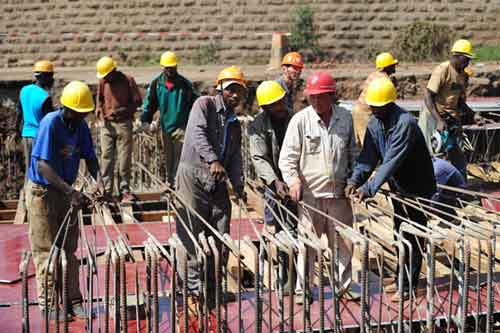
|
New initiatives to lift investment in the continent The China-Africa Business Council and the China-Africa Development Fund have decided toset up two new funds this year boost China's investment in Africa. One fund is for commercialventures, and the other, for mining activities. Zheng Yuewen, chairman of CABC, which represents the interests of more than 550 Chinesecompanies in Africa, said each fund will raise $1 billion in its initial phase from membercompanies and the CADFund, China's largest private equity fund focusing on Africaninvestments. Offices for the funds will be established in Beijing this month. "China has been looking to invest in different ways in Africa, instead of focusing only onbuilding infrastructure projects such as roads, bridges, ports and stadiums throughout thecontinent," said Zheng. The changing global investment environment and the lingering debt crisis in the eurozone haveprompted major economies such as the United States, the United Kingdom, France, India andJapan to shift their investment focus from traditional markets in Europe and Asia, to Africa. Additionally, Africa's hunger for urbanization, commodities, jobs, new overseas markets, andimproved manufacturing, trade, services and resource sectors, has presented unprecedentedbusiness opportunities to foreign investors. "African countries have good opportunities to capitalize on high international commodity prices,their young energetic labor forces and abundant resources," Zheng said. "They also have the opportunity of taking advantage of the global investment trend to seeksolutions to poor levels of infrastructure, the high unemployment and poverty by acceleratingtransformation through commodity-based industrialization. "The continent can go through the same industrial transformation as China did three decadesago, and in time it will become a major goods producer, rather than just being a shipper of rawmaterials to different foreign destinations," Zheng said. He said that during this long-term transition, more Chinese companies will move their factoriesto Africa to help the continent upgrade its technological ability. The two new funds will provide capital to Chinese enterprises seeking investment opportunitiesin Africa, particularly in the mining sectors, commercial and trade investment. To further strengthen cooperation with Africa, the Chinese government has consistentlyencouraged capable State-owned and private companies to invest there. It has also supported the African Development Bank and the West African Development Bankby injecting funds, canceling debts, and establishing joint funds for a number of manufacturingand construction projects. China-Africa trade stood at nearly $200 billion last year, while Chinese investment in Africa hasreached $17 billion, according to the department of African affairs at China's Ministry ofForeign Affairs. In December of 2012, CABC surveyed the 198 member companies which had established apresence in 32 countries across Africa. With 34,000 local employees and 6,400 Chineseworkers, the companies had trade relations with 51 African countries and $2.4 billion in salesrevenue last year, representing about 16 percent of their total business revenues. The 198 companies, including Chongqing-based automobile producer Lifan Group,Guangdong-based shoemaker Huajian Group and power supplier Shenzhen EnergyCorporation, have so far invested $1.1 billion in the 32 African countries and have plans toinvest an additional $5 billion over the next three years. Around 80 percent of CABC's members are private companies and the rest are State-ownedenterprises. Chi Jianxin, president of the CADFund, said: "In contrast to State-owned enterprises, whoseAfrican sales are largely based on huge infrastructure projects, private-sector Chinesecompanies are more sophisticated in processing local products like cotton and leather intomanufactured goods such as garments and shoes." Chi added that even though logistics costs remain high in Africa, preferential tariffs for Africanexports to developed markets, low labor costs and favorable investment policies can make upfor this. More than 700,000 people have benefited from the CADFund throughout the continent overthe past six years. Its investment now contributes $1 billion in tax revenues to different Africangovernments, and funds the export of some $2 billion worth of goods each year. The latest China-Africa ventures to be created include a partnership between Chinese cementproducer Tangshan Jidong Cement Co Ltd and household appliance manufacturer HisenseGroup, who have created a cement plant with 1 million tons of annual production capacity, anda home appliance factory that will be operational in South Africa this month. Elsewhere, a cotton spinning industrial park in Tanzania and an iron mine that produces 1million tons per year in Liberia, will be launched in the second half of this year. |
随着中非经贸关系的快速成长,有越来越多的中国企业希望到非洲来投资和建立生产基地。在这样的大背景下,中非民间商会和中非发展基金将共同成立一个矿业子基金和一个商贸综合体子基金来进一步帮助中国企业在非洲发展。 中非民间商会会长郑跃文表示每个子基金的项目额度在第一期将达到10亿美元。中非民间商会将和国内最大的私募股权基金也是中国第一支专注于对非投资的股权投资基金--中非基金共同筹集资金。负责管理这两个基金的正式机构将于本月设立于北京。 “中国目前正在调整其与非洲的合作战略,并使其多样化,中非合作不再是仅仅局限于修建桥梁,公路,港口和体育场,”郑跃文说。 在当前的国际经济形势下,美国,英国,法国,日本,印度等国家正将他们的目光从传统的欧亚市场投放到非洲市场来。非洲国家和人民对加速城市化进程,发展第三产业,资源开发行业,增加新的出口目的地,工作机会和更多的商品的需求和渴望为这些国家在次贷危机后的特殊时期间接创造了更富有潜力的市场。 依托非洲当地优质的劳动力和丰富的自然资源,郑跃文说非洲国家有非常好的机会来获取更多的利润通过坚挺的国际大宗产品价格。同样,这些机会也来自国际投资方向的转变。非洲国家可以通过外部投资建立起以出口为目的的工业基地来带动国内基础设施建设的发展,并且创造更多就业机会和消除贫困。 “非洲大陆可以走中国三十年前所走过的工业化道路来成为一个主要商品生产者,而不是将自己的资源以低廉的价格销售到其它发达国家市场和发展中经济体,”郑跃文说。 “这个漫长的工业化过程无疑给中国企业带来了前所未有的机遇来把更多的生产线和工厂移到非洲,因为非洲大陆现在还没有拥有最好的工业品生产技术来进军全球市场。这两个子基金将为中国企业提供机会和资金帮助,而且也能进一步的协助有潜力的中国公司投资于非洲的矿业和商品贸易行业,因为中国企业遵循贸易先行原则,希望通过做贸易来更好的了解非洲市场。” 为进一步的辅助中国企业进军非洲,中国政府近年来不断加大了对国有和私营企业参与非洲经济建设的鼓励政策。同时和非洲发展银行,西非发展银行合作进一步为中国企业投资非洲的制造业和基建工程项目打造平台。根据中国外交部非洲司的统计,中非双边贸易额目前已经超过2000亿美元,中国对非洲的投资也超过了170亿美元。 2012年12月,中非民间商会对198家会员企业进行了统计,这198家企业共拥有4万员工在非洲工作,其中,中国国内派出人员6400人,非洲当地雇员34000人。2012年,这198家中国企业在非洲地区的营业收入达到了24亿美元,占他们总体营业收入的16%。 这198家中国企业譬如广东的华坚集团,深圳能源和重庆的力帆集团已经在非洲的32个国家累计投资了11亿美元。在未来三年内,他们计划在非洲市场继续投资50亿美元来进一步的扩大生产和开展新的业务。目前,80%的商会会员企业是私营企业,其余的会员企业是中国的大型国有企业。 迟建新,中非发展基金总裁认为和中国的国有企业相比,中国的民营企业在项目的选择上有更大的余地,自主性更强,投资策略可以更加灵活,譬如他们可以灵活的贴近非洲原料产地设立富有竞争力的服装和制鞋企业。国有企业在非洲发展目前还只主要依赖大型基建项目建设。 “尽管物流费用在很多非洲国家依然高昂,但销往发达国家市场的关税确是非常优惠的,相对低廉的劳动力成本和鼓励性投资政策可以弥补物流费用高昂的不足,”迟建新强调。 在过去的六年时间,已经有70万非洲人民从中非发展基金在非洲的项目中受益。它的项目和投资为不同的非洲国家政府贡献了每年10亿美元的税收和20亿美元的出口。 本月,中非发展基金与唐山冀东水泥股份有限公司,海信集团合作,在南非开始运营一个年产量1万吨的水泥厂和一个家用电器工厂。在下半年,一个棉纺工业园将在坦桑尼亚建立。此外,一个具有年产量一百万吨的铁矿也将在利比里亚投产运营。 (中国日报记者 钟南 编译) 相关阅读 (中国日报记者 王恺昊 杨芳 编译) |